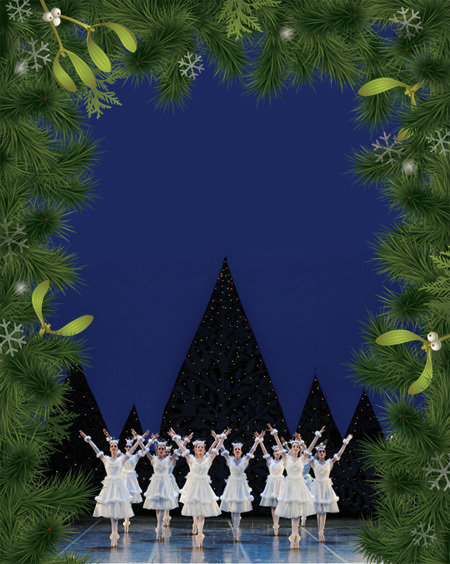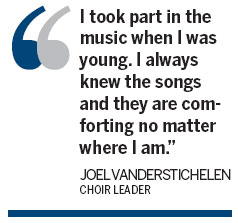



Christmas, of all the universal festivals, is probably the most commercialized of them all. In China, the jangle of cash registers threatens to drown out the true meaning of Christmas. But there are pockets of light, and they shine out through music and stage. Eric Jou and Tiffany Tan seek out the sounds of Christmas.
On a cold December night in Beijing, crowds gather at the Hilton Hotel lobby, eager to listen to a choir gathering on stage. There is the smell of ginger and spice and mulled wine mixed with the aroma of warm pine. For an instant, this could be anywhere but China.
Up on stage, a mixed crowd of expatriates and locals settle into rows, sheet music out, ready to sing.
As soon as the first note rings out, the crowd relaxes and no one bothers about the oddity of the full Christmas trappings of tree and lights and carolers smack in the middle of the East Third Ring Road.
The performance at the Hilton was a first for the choir from Our Lady of China, which is part of Saint Joseph's Cathedral in Beijing.
"This is my first Christmas in Beijing, I wanted to see what it was like," says Signe Knutson. "It was good to experience this, being away from home to hear the songs that I grew up with."
Knutson, 23, an American working in Beijing for a study-abroad program, will be celebrating her first Christmas in Beijing. She says that while the music wasn't mind-blowing, it was comforting to know some of the Christmas traditions that she grew up with were also here. What surprised her most was the fact that the Saint Joseph's choir was just as much Chinese as expatriate.
Mrs Gao, 30, who only gave her husband's surname, was in the crowd with her one-year-old girl, Gao Xin. She is a Christian who celebrates Christmas at home, but says she was particularly pleased to have the opportunity to hear a live choir of carolers.
"I'm very excited to see this," she says. "Gao Xin seems very eager and happy. This is all very new to her."
East meeting West at Christmas is not just apparent at all the major hotels, but also all over the city with decorations and sales. And as shoppers browse, the piped music overhead plays a repertoire that includes Christmas music such as O Holy Night, Joy to the World and Silent Night.
Church community organizer Tom Sendlein of Our Lady of China says music plays an important part to the tradition of Christmas.
"Basically Christmas is about Christ and there are many songs that go with the message of Christmas," he says.
Having been in China for more than seven years, Sendlein says many people celebrate Christmas by getting together to sing because it is a way to manifest their faith, just like Christians anywhere in the world.
"The true spirit of Christmas is celebrating Christ's birth and also to follow his example in serving others," says Sendlein.
Donations accepted when the choir sings goes to helping old folks, people who have no means to support themselves, orphans, and students who are the children of migrant workers.
For some choir members, it is more than just a spiritual release but also a comfort when they are away from home. Joel Vanderstichelen, 55, a technical services director from Belgium, says the music helped him reconnect with his upbringing and faith.
"I took part in the music when I was very young. I always knew the songs and they are comforting no matter where I am."
Vanderstichelen played the pipe organs and never really performed with a choir until he came to China. He joined the group at St. Joseph's and was asked to lead the choir.
There are others who prefer to take part in a different tradition - the Christmas pantomime.
Every year since he was 7, Andrew Donnelly would watch a pantomime at Christmas. That tradition stopped when he was 21, the year he left Britain to become an English teacher in China. A decade later, the winter play is back in his life - only this time, he is no longer in the audience, but on stage.
Donnelly, 33, played Baron Clarence Bankrupp, the absent-minded father of the heroine in Beijing Playhouse's recently concluded production of Cinderella.
"I love being on stage, I love being under the spotlight," Donnelly says before one performance. "When I heard the next show was going to be a British panto, we were all just - we'll be auditioning then."
As expected from a modern-day British pantomime, or panto, it had about a dozen musical numbers, including the theme music from the Rocky films, Dancing Queen by the Swedish pop group ABBA and Yuletide songs like We Wish You a Merry Christmas.
The mostly foreign actors also slipped in a Chinese phrase or two, which never failed to crack up the Chinese audience. The point was to create a loud, funny, interactive show for the whole family, and the British formula apparently worked fine in the Chinese capital.
"Of our popular shows, this one might be number one," Chris Verrill, Beijing Playhouse's executive director, says two nights before the show closed.
But the attendance also tells a different story. While people will come watch Beijing Playhouse's regular shows any time of the year, watching a pantomime at Christmas is still largely an expatriate indulgence.
"Chinese people don't come to theater for Christmas," says Verrill.
There's no clearer reflection of this than this month's productions at the National Center for the Performing Arts (NCPA), China's top performing arts venue.
The lineup is a mix of Western and traditional Chinese operas, dramas and a ballet - almost like any other month of the year.
"Christmas Day is a regular workday for us," Wang Chang, an NCPA public relations officer, says, confirming that the center has no special Christmas programming because there is no obvious demand.
"It's not an official holiday, so I think people do not arrange special or big events this day. They'll only want to have dinner or go to the bar with friends."
The closest thing the center has to what's considered a Yuletide production overseas is The Nutcracker, a ballet about a young girl who dreams of a Nutcracker Prince on Christmas Eve.
But the show is not on until the second week of January, by which time it has become a Spring Festival offering. (Spring Festival arrives on Jan 23, 2012.
The NCPA has made the ballet open to an audience of both adults and children, making it a rare, yearly family affair - like Christmas plays are in the West.
"I think our celebration of Spring Festival is the equivalent of Christmas overseas," Wang says. Some things still have unique Chinese characteristics.
You may contact the writers at sundayed@chinadaily.com.cn.
(China Daily 12/25/2011 page1)